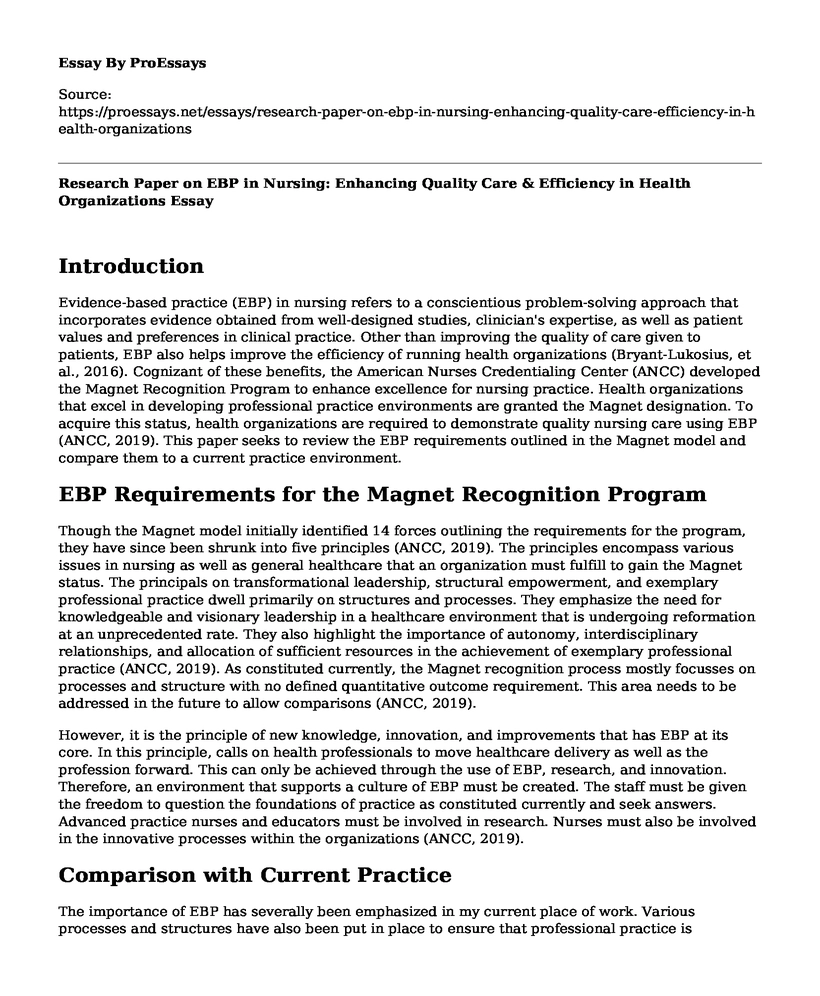Introduction
Evidence-based practice (EBP) in nursing refers to a conscientious problem-solving approach that incorporates evidence obtained from well-designed studies, clinician's expertise, as well as patient values and preferences in clinical practice. Other than improving the quality of care given to patients, EBP also helps improve the efficiency of running health organizations (Bryant-Lukosius, et al., 2016). Cognizant of these benefits, the American Nurses Credentialing Center (ANCC) developed the Magnet Recognition Program to enhance excellence for nursing practice. Health organizations that excel in developing professional practice environments are granted the Magnet designation. To acquire this status, health organizations are required to demonstrate quality nursing care using EBP (ANCC, 2019). This paper seeks to review the EBP requirements outlined in the Magnet model and compare them to a current practice environment.
EBP Requirements for the Magnet Recognition Program
Though the Magnet model initially identified 14 forces outlining the requirements for the program, they have since been shrunk into five principles (ANCC, 2019). The principles encompass various issues in nursing as well as general healthcare that an organization must fulfill to gain the Magnet status. The principals on transformational leadership, structural empowerment, and exemplary professional practice dwell primarily on structures and processes. They emphasize the need for knowledgeable and visionary leadership in a healthcare environment that is undergoing reformation at an unprecedented rate. They also highlight the importance of autonomy, interdisciplinary relationships, and allocation of sufficient resources in the achievement of exemplary professional practice (ANCC, 2019). As constituted currently, the Magnet recognition process mostly focusses on processes and structure with no defined quantitative outcome requirement. This area needs to be addressed in the future to allow comparisons (ANCC, 2019).
However, it is the principle of new knowledge, innovation, and improvements that has EBP at its core. In this principle, calls on health professionals to move healthcare delivery as well as the profession forward. This can only be achieved through the use of EBP, research, and innovation. Therefore, an environment that supports a culture of EBP must be created. The staff must be given the freedom to question the foundations of practice as constituted currently and seek answers. Advanced practice nurses and educators must be involved in research. Nurses must also be involved in the innovative processes within the organizations (ANCC, 2019).
Comparison with Current Practice
The importance of EBP has severally been emphasized in my current place of work. Various processes and structures have also been put in place to ensure that professional practice is enhanced in line with the requirements of the Magnet program. However, in my assessment, the success of the efforts has been low, and the incorporation of EBP into clinical practice has fallen short. The leadership has not adequately created awareness of EBP. A significant percentage of nurses, therefore, lack enough knowledge on ways of incorporating research findings into their practice. Nurses do not possess in-depth knowledge on ways to carry out research and hence are often left out in various studies (Warren, et al., 2016).
Nurses are also overwhelmed due to the shortage of nurses being experienced in the country and hence are left with little time to carry out research. For example, nurses in the workplace work long hours in the hospital and are also supposed to fulfill other social obligations. In such an environment, the majority of nurses can only manage to carry out their usual practice (Wang, Liu, & Wang, 2015). The leadership has also not succeeded in transforming the culture of the organization, and hence, there exists negative attitude and misperception towards EBP especially among the old nurses (Warren, et al., 2016). Contradictory patient expectations aggravate this problem. Lack of adequate resources is also an impediment to the involvement of nurses in research and EBP. For instance, sufficient nursing journals are not provided in my current practice environment.
Conclusion
The benefits of EBP to the patients, health organizations, and the nursing profession cannot be overemphasized. However, to fully enjoy these benefits, favorable structures and processes must be developed. The Magnet Program offers guidelines that can help in the achievement of this aim. However, unfavorable organizational culture, as well as constraints in resource allocation, hinder the optimum application of these guidelines.
References
ANCC. (2019). Magnet Model. Retrieved from ANCC: https://www.nursingworld.org/organizational-programs/magnet/magnet-model/
Bryant-Lukosius, D., Spichiger, E., Martin, J., Stoll, H., Kellerhals, S., Fliedner, M., . . . Schwendimann, R. (2016). Framework for evaluating the impact of advanced practice nursing roles. Journal of Nursing Scholarship, 48(2), 201-209. Retrieved from https://sigmapubs.onlinelibrary.wiley.com/doi/abs/10.1111/jnu.12199
Wang, S., Liu, Y., & Wang, L. (2015). Nurse burnout: Personal and environmental factors as predictors. International journal of nursing practice, 21(1), 78-86. Retrieved from https://onlinelibrary.wiley.com/doi/abs/10.1111/ijn.12216
Warren, J. I., McLaughlin, M., Bardsley, J., Eich, J., Esche, C. A., Kropkowski, L., & Risch, S. (2016). The strengths and challenges of implementing EBP in healthcare systems. Worldviews on EvidenceBased Nursing, 13(1), 15-24. Retrieved from https://sigmapubs.onlinelibrary.wiley.com/doi/abs/10.1111/wvn.12149
Cite this page
Research Paper on EBP in Nursing: Enhancing Quality Care & Efficiency in Health Organizations. (2023, Jan 27). Retrieved from https://proessays.net/essays/research-paper-on-ebp-in-nursing-enhancing-quality-care-efficiency-in-health-organizations
If you are the original author of this essay and no longer wish to have it published on the ProEssays website, please click below to request its removal:
- Human Immunodeficiency Virus and Acquired Immune Deficiency Syndrome among Latinos and Hispanics in the United States
- Community Health History Essay
- Literary Analysis Essay on Notes From Underground by Fyodor Dostoyevsky
- Essay Example on No Legal Age of Consent for Medical Treatment in Ontario
- U.S. Pharmaceutical Price Reductions: R&D, Reimbursement, & Determinants - Essay Sample
- Botswana's HIV Crisis - Free Essay Sample
- Free Essay Sample on Modernizing Hammington's Healthcare Services: A Necessity







